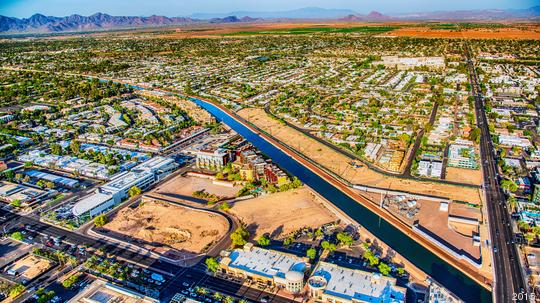
Arizona’s rapidly growing technology sphere includes industries like semiconductors, electric vehicles, automated vehicles, batteries, quantum computing and more. But just one of these growing industries can claim a nearly 2000-year history in the state — freshwater science.
Beginning around 100 A.D., the Hohokam people, who farmed and lived in central and southern Arizona, developed one of the world’s most advanced irrigation systems, one that stretched hundreds of miles and supported a thriving civilization. Nearly two thousand years later, the Hohokam’s engineering marvel makes up the groundwork of Arizona's modern water delivery system.
Bolstered by a sophisticated network of dams, reservoirs and canals, the metro areas of Phoenix and Tucson today support approximately 6 million people and growing. Advances in water efficiency and conservation mean the state uses less water than it did in 1957 — with seven times the population and 19 times the economy.
Arizona continues to drive innovation in freshwater science.
Water research
The University of Arizona has been at the forefront of water research for years. Today, nearly 300 faculty and researchers specialize in water topics. The University of Arizona also creates new technologies for water treatment, reuse and management. Industry partnerships help the university’s water experts pilot new technologies in biofuel production, water-efficient manufacturing and more.
At Arizona State University’s Ira A. Fulton Schools of Engineering, Dr. Cody Friesen has discovered a way to create water out of thin air.
Friesen’s company, SOURCE Global (formerly Zero Mass Water), makes the SOURCE hydropanel that can be installed any location in the world with access to sunlight. The solar-powered device extracts water vapor from the air to generate a sustainable supply of pure drinking water while eliminating the need for power from an electric grid.
“We created SOURCE to perfect water for every person, every place, including those who have no water in their homes, who are dealing with contamination, aging infrastructure and shrinking water supplies,” said Friesen, a senior Global Futures scientist at ASU’s Julie Ann Wrigley Global Futures Laboratory.
From its Scottsdale headquarters, SOURCE Global has helped bring fresh drinking water to some of the most parched places on earth, including native communities in Australia and desert regions in sub-Saharan Africa. The company operates in 52 countries and on six continents.
In addition, launched in 2015, the University of Arizona’s Water & Energy Sustainable Technology (WEST) Center is pioneering research in desalination systems, wastewater treatment and monitoring, and contaminant removal. In 2020, the center developed novel procedures to test for Covid-19 in wastewater, technology that helped provide early detection of asymptomatic cases around the state.
Water innovation
Arizona is also attracting water innovators. In Avondale, west of Phoenix, agritech company OnePointOne last year launched a 50,000-square-foot vertical farm that uses 99% less land and water than traditional agriculture. “We are on a path to fundamentally rethink how plants are grown, utilized and optimized,” CEO Sam Bertram said.
Helping drive innovation from a statewide level is Governor Doug Ducey, who made water a top priority upon entering office.
Speaking to the Water Technology and Environment Control (WATEC) Exhibition in Tel Aviv, Israel in 2015, Governor Ducey stated, “We know that we can share technology, best management practices, planning methodologies and information in partnership with Israel to address our challenges and improve our sustainable water future.”
That partnership is already bearing fruit.
One of the many Israeli-based companies operating in Arizona since 2015 is N Drip, which has invented a gravity-fed irrigation system for farming operations, eliminating the need for expensive pumps, filtration systems and electricity required by traditional drip systems.
Through partnerships with Central Arizona Project, the Colorado River Indian Tribes, and the University of Arizona, the N Drip systems are delivering up to 40-50% water savings with increased crop yields.
In 2019, the governor’s leadership brought together more than 40 water stakeholders from around the state to pass the Drought Contingency Plan, a blueprint for storing more water in Lake Mead.
In his most recent executive budget proposal, the governor calls for a generational investment of $1 billion to secure Arizona’s water future for the next 100 years through new water sources and integrating new technologies, including desalination.
Working together, Arizona’s innovators and policy experts are pioneering some of the most advanced water innovations anywhere in the world.
If Arizona’s unique history and makeup provide any insights, there may be no better place to develop solutions for this global challenge.